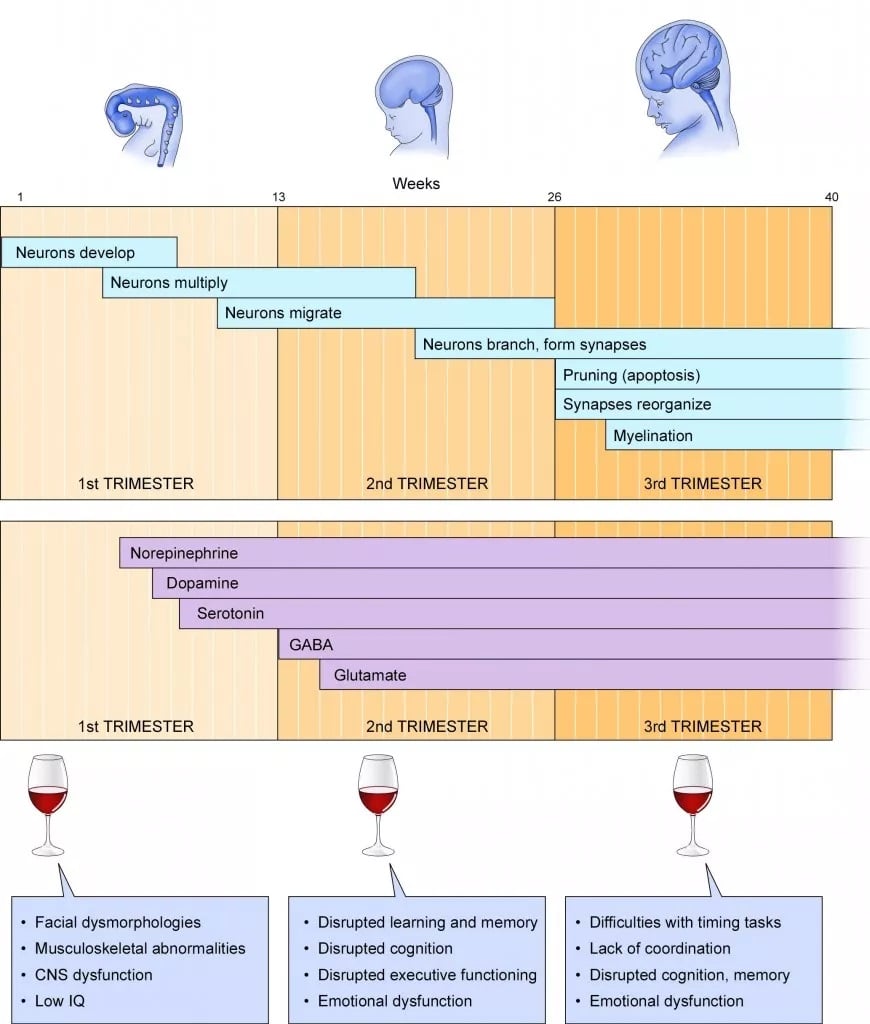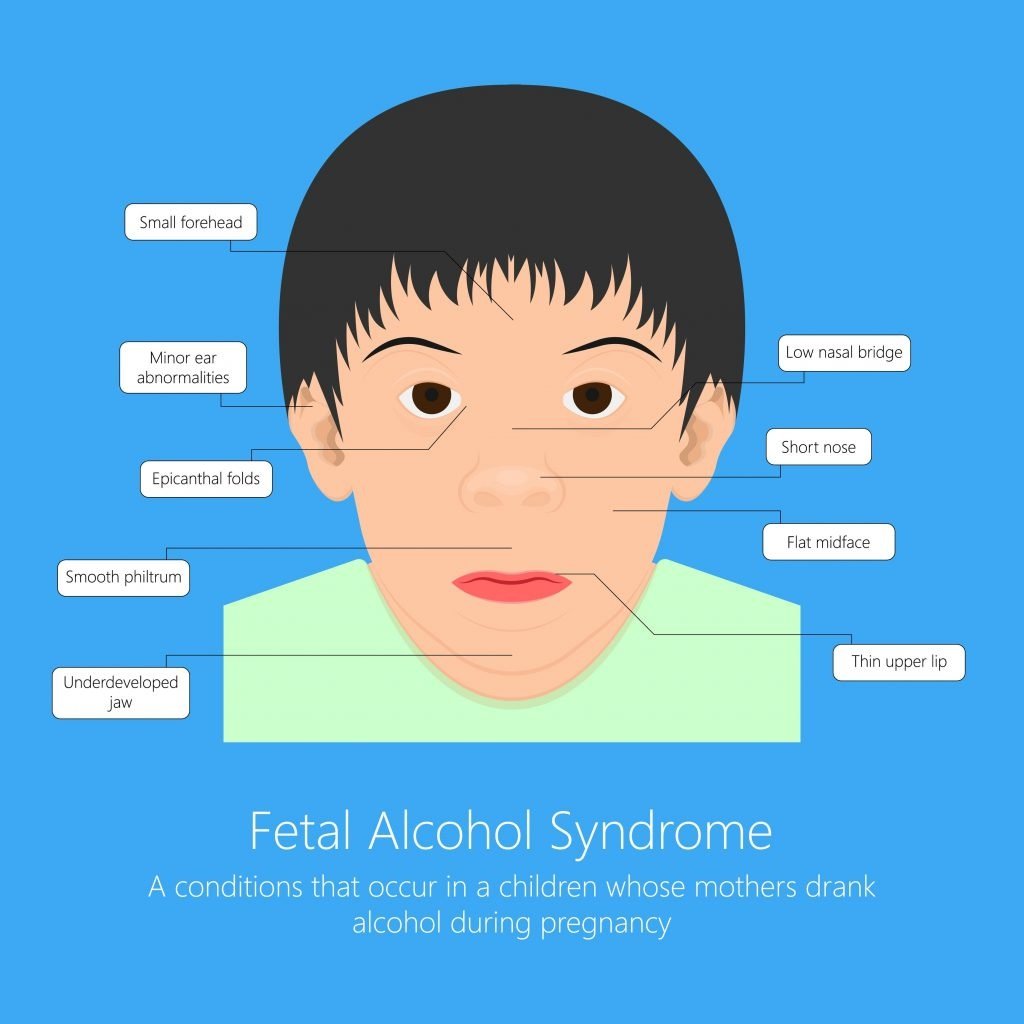Part of the complete guide to understanding addiction
Alcohol Use During Pregnancy
As the roles and places of women in society have changed, more women are drinking alcohol and partying than ever. According to the World Health Organization (WHO), about 31% of women of childbearing age drink alcohol. Subsequently, an alarming rise has been seen in women drinking alcohol while pregnant. Although moderate alcohol consumption is okay for an adult, it can cause irreparable damage to a developing fetus. The CDC reports that about 6-9 out of every 1,000 children have symptoms of Fetal Alcohol Syndrome at birth. It can also develop later as well. FASD is a disorder with a range of physical, chemical, and intellectual ramifications resulting from alcohol exposure as a fetus. Unfortunately, despite this severe risk to the fetus, about 14% of women report drinking while pregnant. This can sometimes result from being unaware of pregnancy or, in some cases, being too addicted to stop. Pregnancy can exacerbate the impulse to drink for a woman who struggles with alcoholism. Alcohol use during pregnancy puts unborn children at risk for many developmental abnormalities.
How Does Alcohol Affect the Fetus During Pregnancy?
The fetus receives all its nutrition through the umbilical cord. If any alcohol is in the mother’s blood, it is transferred to the child. The developing child cannot metabolize alcohol in the manner an adult can, so damage occurs.
Alcohol Through Stages of Pregnancy

- First Trimester- During the first trimester, organ formation occurs. Fetal alcohol exposure during this stage can cause physical abnormalities. Alcohol can cause the baby to have physical deformities such as a smaller head and low birth weight.
- Second Trimester- The spinal cord and brain still develop throughout pregnancy. Therefore, drinking alcohol during this stage can cause brain damage.
- Third Trimester- During this phase, the baby is growing rapidly. Therefore, alcohol consumption can interfere with many of the growing baby’s systems.
Alcohol, according to the CDC, is connected to a range of disabilities, including miscarriage and stillbirth in utero. Fetuses exposed to alcohol can develop Fetal Alcohol Spectrum Disorders (FASDs) | CDC.
There are three disorders included in this group.
- Fetal Alcohol Syndrome (FAS) is the most severe disorder. It can include fetal death and abnormal facial features. These children also have central nervous system dysregulation and learning problems.
- Alcohol-Related Neurodevelopmental Disorder (ARND). These children will have some of the symptoms of FAS but not all. Similarly, they can experience learning problems and behavioral problems.
- Alcohol-Related Birth Defects (ARBD). Congenital disabilities can include heart, kidney, and bone abnormalities. Alcohol has also been related to hearing loss or a combination of these abnormalities.
Symptoms of FASD
- Abnormal facial features, such as a smooth ridge between the nose and upper lip (this ridge is called the philtrum)
- Small head size
- Shorter-than-average height
- Low body weight
- Poor coordination
- Hyperactive behavior
- Difficulty with attention
- Poor memory
- Difficulty in school (especially with math)
- Learning disabilities
- Speech and language delays
- Intellectual disability or low IQ
- Poor reasoning and judgment skills
- Sleep and sucking problems as a baby
- Vision or hearing problems
- Problems with the heart, kidney, or bones
How Does Alcohol Enter the Fetus?
While developing, the fetus receives its nutrition from the mother. This happens through the umbilical cord, which passes through a space in the placenta, the protective barrier surrounding the fetus. The placenta typically serves as a “filtering” system, ensuring the unborn child only absorbs nutrition that is good for it. However, alcohol contains properties that allow it to pass through the placenta into the fetus. When alcohol passes through, the fetus has no capability of filtering out the adverse effects of alcohol. Therefore, it is at a much greater risk of the negative side effects of alcohol. This, in turn, causes extreme abnormalities.
How Much Alcohol Can Be Had While Pregnant?
So, how many ounces of wine can a pregnant woman drink? This question is very commonly asked, and the reality is that no amount is really safe.
Research has shown that there is no safe amount of alcohol during pregnancy. Any alcohol use can be harmful to a fetus. This general rule also applies to the trimester and type of alcohol. During all the stages of pregnancy, alcohol use will put the fetus at risk for developmental abnormalities. Binge drinking and frequent alcohol use have been directly linked to many conditions post-birth and fetal death. Research is being done to determine if moderate drinking affects the baby as well. All alcohol can be dangerous during all stages of pregnancy. This applies to alcohol in food, beer, or other drinks that contain a lower percentage of alcohol and any other forms. Research has shown that binge drinking puts the baby at the highest risk, while moderate drinking sometimes causes harm.
Is Drinking Alcohol While Pregnant Illegal?
Drinking alcohol while pregnant is a type of “harm to others.” However, the federal government has not yet enacted laws against it. There are states with regulations and rules against alcohol consumption while pregnant. In some areas, alcohol consumption while pregnant can be prosecuted as child abuse.
States that currently have regulations against alcohol consumption while pregnant.
- Alabama
- Arizona
- Colorado
- Florida
- Georgia
- Illinois
- Indiana
- Kentucky
- Massachusetts
- Maine
- North Dakota
- Nevada
- Oklahoma
- Rhode Island
- South Carolina
- South Dakota
- Texas
- Utah
- Virginia
- Wisconsin
While the federal government has not made alcohol use illegal while pregnant, they warn against it.
How To Prevent Fetal Alcohol Syndrome?
FASD is a preventable disease.

Here are some ways to protect the fetus from FASD.
- Stop drinking alcohol when trying to conceive. The fetus can be affected even in the earliest stages of development. Therefore, doctors suggest that if a woman is trying to conceive, she should stop alcohol use immediately.
- Stay away from alcohol if having unprotected sexual intercourse. Children born with FASD often come from unplanned pregnancies.
- Unfortunately, for those addicted to alcohol, stopping to drink can be challenging, even when pregnant. Therefore, it is essential to get help before the addiction can affect another life.
- Avoid alcohol throughout the entire pregnancy. Many studies show that even small quantities of alcohol can cause damage to the fetus. Therefore, during the whole pregnancy, one should avoid alcohol.
The most significant step toward preventing FASD is to treat alcoholism before pregnancy. This can be done by becoming aware of what an alcohol addiction looks like and seeking help. Places like Avenues Recovery can help women struggling with addiction navigate their pregnancy while remaining alcohol-free.
Many women are discouraged from drinking alcohol during pregnancy due to the unpleasant odor it causes. To learn more about what an alcoholic smells like, read our online resources.
Sources
[1] www.cdc.gov


